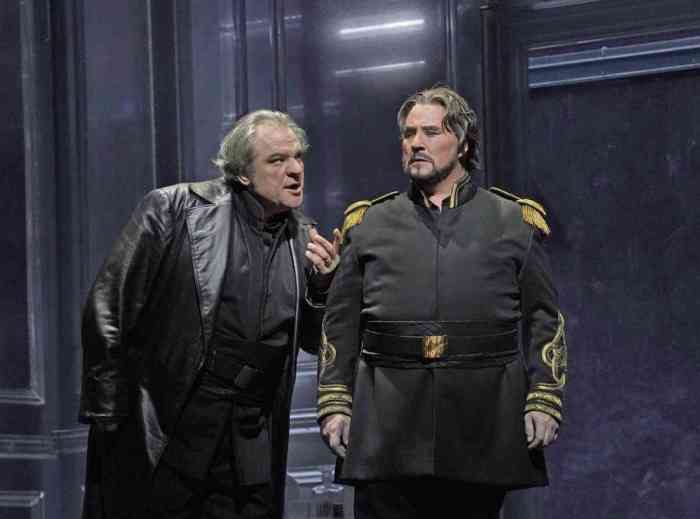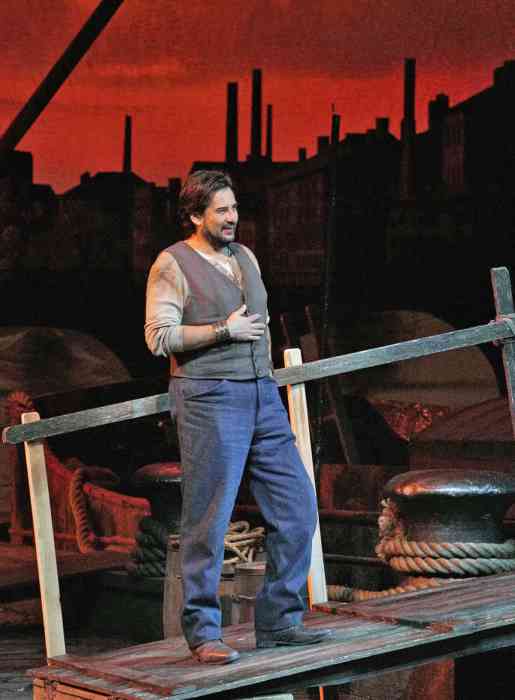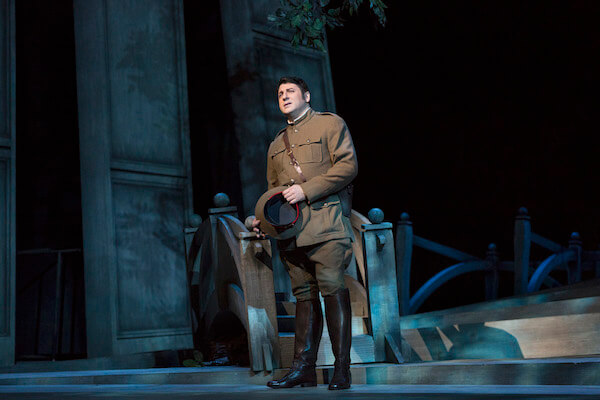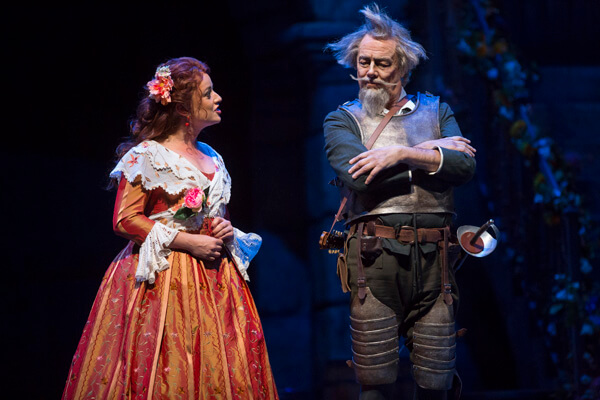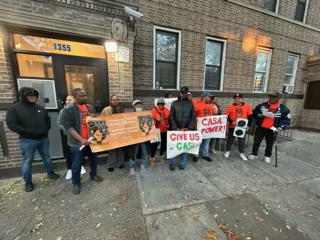Stefano de Peppo's facial expressions in “A King for a Day” were worthy of a Molière comedy. | ROD MILLINGTON/ SARASOTA OPERA
Giuseppe Verdi’s bicentennial is coming up in October 2013 but opera houses in New York and worldwide have been celebrating early. Sarasota Opera’s Winter Festival is close to completing a traversal of his entire canon.
Verdi’s second opera and first comedy, “Un Giorno di Regno” or “A King for a Day” (1840), was composed during a tragic period of the composer’s life after he lost his wife and two children. It was booed at the La Scala opening night and the remainder of the run was canceled. Verdi didn’t attempt another opera buffa until 53 years later with his last opera “Falstaff.”
“King for a Day,” however, has a vivacious score with a steady flow of pleasing melody and rhythmic verve in the comic Rossini-Donizetti style. It is clearly the work of a major new talent. Felice Romani’s recycled libretto sets up familiar mistaken identity situations but fails to develop them cleverly; the second acts runs out of ideas and then abruptly resolves the plot in an unconvincing manner.
Impending bicentennial prompts ““Un Giorno di Regno,” “I Lombardi,” “Rigoletto” from Sarasota to Manhattan
The Sarasota Opera puts on solid traditional productions with good musical values and promising young voices. This was the premiere of the new critical edition of the score edited by Dr. Francesco Izzo. Artistic director Victor DeRenzi led the score with precise control, rhythmic variety, and brio. Martha Collins’ production used lightweight painted scenery and kept the action moving briskly.
As the fake King Stanislaw (really Count Belfiore), baritone Corey Crider was a touch heavy-footed, singing with too much vocal weight and too little textual inflection. Mezzo Jennifer Feinstein turned the Marchesa del Poggio into a delightful screwball heroine, alternating guile with bewilderment and singing with a nice mix of fruity warmth and bright flexibility.
Hak Soo Kim as the tenor juvenile had a bright upper register, while soprano Danielle Walker as the mezzo ingénue Giulietta looked winsome and sounded lush. Milanese buffo specialist Stefano de Peppo provided native Italian and a rich bass-baritone as the King’s dyspeptic host Baron di Kelbar. His witty facial expressions were worthy of a Molière comedy. Bass Kevin Short blustered amusingly as La Rocca.
In March 2014, Sarasota will present Verdi’s “Jérusalem,” a French-language reworking of “I Lombardi alla prima crociata.”
Eve Queler returned to the podium at Opera Orchestra of New York on April 8 for a concert performance of Verdi’s fourth opera, “I Lombardi” (1843). She has conducted this opera twice before, and here relished Verdi’s fanfares and marches (brasses were positioned up in boxes) as well as the stirring choruses.
Headlined by two rising young stars and Academy of Vocal Arts alumni, soprano Angela Meade and tenor Michael Fabiano, this turned out to be a vocal feast loudly acclaimed by an enthusiastic connoisseur audience. Everyone was in great voice, holding on to high notes for days while the octogenarian maestra marshaled her forces with brio.
Meade is the object of some controversy as to whether she is truly the successor to Sutherland and Caballé (she lacks the dramatic conviction and visual charisma of a Callas). Becomingly gowned, her vocal pedigree here was beyond doubt. She floated lush arcs of tone, deftly launched cadenzas and trills, and in the broader melodies opened up her tone with billowing spinto warmth.
Meade is more of a cavatina than cabaletta singer, lacking bite in the more dramatic, fast tempo passages. Giselda’s politically charged Act II, scene 3 outburst “Non giusta causa… Dio non vuole,” where she lambasts the crusaders for being more interested in Arab gold than Christian values or patriotic ideals, was cut in half. A shame, since this is one Verdi heroine I’d like to see take on George W. Bush and Dick Cheney — though admittedly Lady Macbeth is perhaps a better candidate.
Fabiano, not yet 30, revealed a muscular lyric tenor with a dark sinewy middle register and an emotionally outspoken delivery that point toward lirico-spinto roles like Turiddu and Puccini’s Des Grieux. His upper register needs less tension and a little more liquid float. But Fabiano’s personal charisma, gorgeous Italian diction, and generous, giving performance style excited the audience.
Kevin Short’s blustering loud and louder style worked better as the buffoonish La Rocca in Sarasota than it did as the villain Pagano. Tenor Noah Baetge capped off Arvino’s Act III duet with the bass with a ringing high C worthy of a Manrico.
Vittorio Grigolo also provided tenorial excitement as the Duke in the second cast of the Met’s new Las Vegas “Rigoletto.” Grigolo’s bobby-soxer pretty boy looks and pop crooner-inflected style were cast to type as the Sinatra-type idol of Michael Mayer’s concept production. Grigolo’s vocal style is brash and somewhat mannered — trumpeted high notes alternate with crooned soft singing, leaving little in between. But the tone is full of juice and energy, and he is a committed, charismatic stage animal who connects with his stage partners and the audience.
George Gagnidze’s more extroverted personality and resemblance to Rodney Dangerfield made a more convincing insult comic Rigoletto than did Zeljko Lucic. Lisette Oropesa’s delicate birdlike timbre embodied girlish innocence as Gilda and she is visually convincing as a teenager. The climactic high staccati of “Caro Nome” were attacked gingerly, and more outspoken passages in the later acts taxed her slender tone. But this is already a lovely portrayal with great promise for the future.
Nancy Fabiola Herrera’s Maddalena had a clearer tone than her predecessor, while bass newcomer Enrico Giuseppe Iori was a solidly menacing Sparafucile. Marco Armiliato was the solid but unenlightening conductor.
Mayer’s highly theatrical production isn’t profound or deeply insightful but creates an atmosphere of omnipresent danger and corruption that works in the story’s favor.


